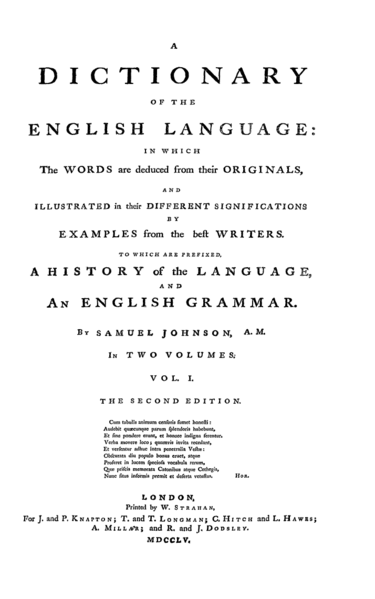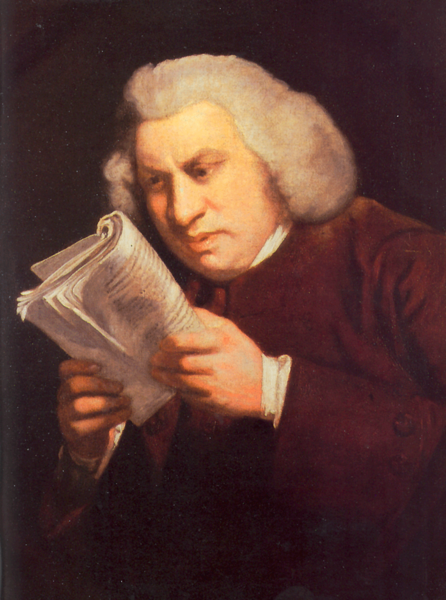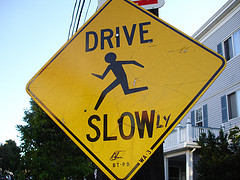3. Paco constantly uses a dictionary

|
| By Samuel Johnson. Public domain |
A Dictionary of the English Language
Whenever Paco doesn't know the meaning of a word in English he looks it up in a dictionary. The following text is an extract from the Preface to Samuel Johnson's A Dictionary of the English Language. Read it carefully.
As language was at its beginning merely oral, all words of necessary or common use were spoken before they were written; and while they were unfixed by any visible signs, must have been spoken with great diversity, as we now observe those who cannot read, catch sounds imperfectly, and utter them negligently. When this wild and barbarous jargon was first reduced to an alphabet, every penman endeavoured to express, as he could, the sounds which he was accustomed to pronounce or to receive, and vitiated in writing such words as were already vitiated in speech.
As you have seen, it is very frequent that adverbs in English end in -ly. It is so because this suffix (-ly) is the main one we use in English to form adverbs. How many frequency adverbs do you remember ending in -ly? usually, generally, normally, regularly, frequently, occasionally, hardly ever and rarely. All of them have been formed by adding suffix -ly to an adjective. Click here if you need to review the rules when adding suffix -ly to adjectives to form adverbs.
|
|
|
So adverbs are really useful to modify verbs, adjectives, other adverbs and even clauses or sentences. However, as you may imagine, not all the adverbs belong to the same group. There are many types of adverbs, and this is what we will see next.
Choose the correct adverb to be placed in the following sentences.
1. Paco will _______________ begin his trip round the world.

|
| By woodley wonderworks. C. Common |
|
Shortily
| |
|
Shortly
|
|
easily
| |
|
easyly
|
|
completly
| |
|
completely
|
|
understandablely
| |
|
understandably
|
|
fantasticly
| |
|
fantastically
|
It is very important that you take into account that:
- Not all adverbs end in -ly. In the text, now, first and already are adverbs which have not been formed from adjectives.
- There are adverbs that are not formed by adding -ly to the adjective. Some examples are: far (adj. far), fast (adj. fast), hard (adj. hard), high (adj. high), late (adj. late), long (adj. long), low (adj. low) and well (adj. good). E.g.: Sofía can run very far, Paco plays tennis very well.
- Not all words ending in -ly are adverbs. Some examples are: costly, cowardly, deadly, friendly, likely, lively, lonely, lovely, silly, ugly and unlikely. All of them are adjectives. E.g.: Paco has a lovely smile, Juan is a lively person.
- Daily, weekly, monthly, yearly and early are both adjectives and adverbs. E.g. It is a daily newspaper (adjective), and This newspaper comes out daily (adverb).
If you doubt if a word is an adverb or not, use a dictionary to check it!
- Here you will find more easy exercises to distinguish adverbs from adjectives.
- Finally, if you click here, you will find another exercise to improve the formation of adverbs.
 |
|
By Sir Joshua Reynolds. Public domain |
SAMUEL JOHNSON
Samuel Johnson (often referred to as Dr. Johnson) was born in 1709 in Lichfield (England) and died in 1784. He contributed to English literature as a poet, essayist, moralist, novelist, literary critic, biographer, editor and lexicographer. Among other reasons he will always be remembered because of the publication after nine years of work of A Dictionary of the English Language (sometimes referred to and published as Johnson's Dictionary) in 1755. His dictionary is frequently considered to be among the most influential dictionaries in the history of the English language since it was the first attempt to fix the English language.
